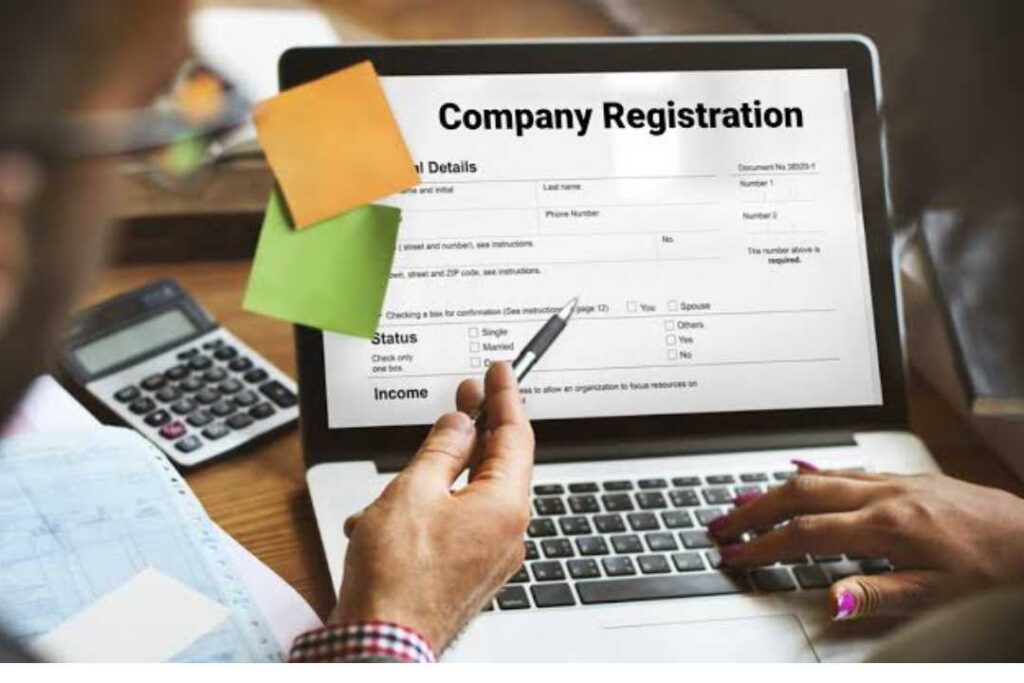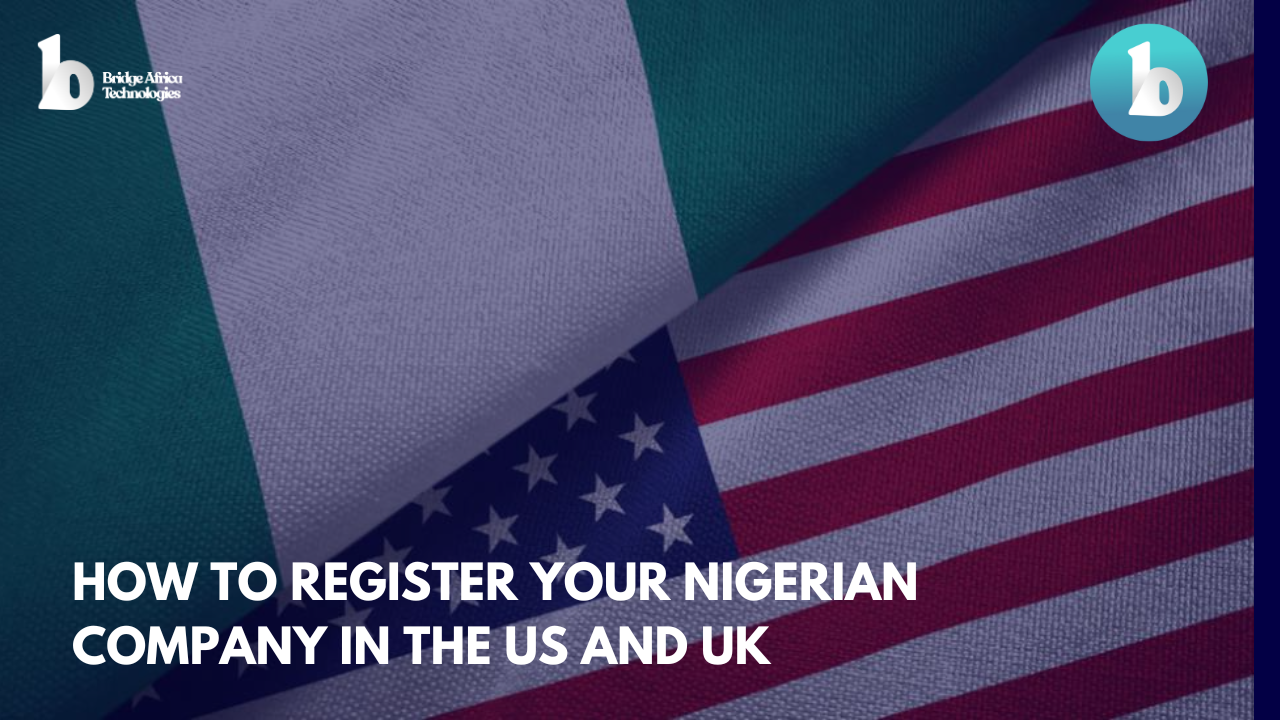If you live in Nigeria, you will agree that the country’s rising inflation rate and volatile foreign exchange policy have necessitated enterprises exploring the prospect of earning in other currencies.
The United States (US) and the United Kingdom (UK), which are home to people from various origins, continue to be popular destinations for doing business in other countries.
As a business owner in Nigeria, a better option to stay ahead of unpredictable foreign exchange policy and receive dollar payments with ease is to establish your Nigerian company in the US and UK and set up a US and UK corporate account.
To that end, in this article, we will go over how to register your Nigerian company in the US as well as registering your Nigerian company in the UK
This article will walk you through the process of starting a subsidiary business or registering your Nigerian firm in the United States or the United Kingdom. Read on!
How to Register Your Nigerian Company in the US and UK
Why Register your Nigerian Company in the US and UK?

If you’ve been in business for a while and have mastered every aspect of running a firm, expanding internationally may be the logical next step.
On the other hand, for the vast majority of others, simply having an internationally registered Nigerian company and business address makes more sense than relocating to these foreign nations to open a physical office.
Whatever the situation may be, there are several reasons why you should establish your Nigerian company in the UK and the United States. Let us look at these reasons.
1. Ability to Access the World’s Largest and Most Diverse Client Base
The United States and the United Kingdom are made up of numerous states with a diversified population of potential customers. Incorporating a corporation in the United States and the United Kingdom will be the first step toward establishing confidence with these customers.
2. Access to Worldwide Venture and Angel Capital Opportunities
Interestingly, venture capital firms and even private investors looking to participate in overseas enterprises need them to be incorporated in the United States and the United Kingdom. Almost many Nigerian startups that have raised funds from such firms are predominantly registered in the United States and the United Kingdom.
3. Access to Business-friendly Laws
When you register your Nigerian company in the United States and the United Kingdom, you will be able to function in an atmosphere with business-friendly legislation that is in line with current business trends.
4. Immigration Opportunities
If you plan to travel to the United States or the United Kingdom in the future, creating a Nigerian firm in those countries will help boost your chances of getting a visa.
5. Ability to own a Corporate Account in the US and UK
Registering your Nigerian company in the United States and the United Kingdom allows it to own a corporation account, making it easier to do transactions with worldwide consumers in foreign currency.
Requirements For Registering Your Nigerian Company in the US and UK
To register your company in the United States and the United Kingdom as a Nigerian resident, you must be at least 16 years old and have one valid proof of ID and address.
What exactly are these forms of ID?
To incorporate your business or startup in the United States or the United Kingdom, you will need to provide one form of identification. The accepted form of identification is a government-issued ID from Nigeria. Proof of identity can be one of the following:
- Passport
- National ID
- Voter Card
- Driving License
Proof of address can include the following:
- Electricity bill
- Water bill
- Gas bill
- Bank statement.
- Driving license
- Tenancy agreement.
How to Register Your Nigerian Company in the United States

Registering your Nigerian company in the US is a complex process that requires a lot of planning and research. Here are steps to achieve this:
1. Determine the Business Strategy
Choosing the correct business model is a crucial decision that affects your US business, and features of the business, such as liability, taxes, and business changes.
Small enterprises, limited liability companies (LLCs), and C corporations are the two most common options for entrepreneurs. Consult with an attorney or a business expert to establish the best solution for your situation.
2. Select the State
The next critical step in starting your business is carefully selecting the state where you want to register. Consider states like Wyoming and Delaware, popular among out-of-state founders due to their outstanding and worker-friendly legal systems that stimulate growth and provide a plethora of value to entrepreneurs.
3. Select the Business Name and Confirm its Availability
Select a unique name for your US business that represents your brand identity. Conduct a thorough search to ensure that another organization isn’t already utilizing the name you’ve picked.
You can also search for existing trademarks on the United States Patent and Trademark Office’s (USPTO) website. It is not necessary to register a trademark, but it might provide additional protection to your brand.
4. Register Your Business with the State
If you wish to do business lawfully in the United States, you must register your company in the state where you intend to establish a presence.
The registration procedure often entails completing the necessary paperwork, paying the requisite price, and submitting pertinent information about your firm.
Each state has its protocols, therefore it is recommended to contact the Secretary of State’s office or engage an expert to assist you with the registration process.
5. Obtain the Appropriate Permits and Licenses
Depending on your work function and role, you may need to obtain certain federal, state, or municipal licenses and permissions. Investigate, identify, and comply with patents and licenses relevant to your firm. Commonly necessary licenses include company licenses, health care licenses, and sales tax licenses.
6. Register with the Internal Revenue Service (IRS)
Obtaining an Employer Identification Number (EIN) from the IRS is an essential step in the registration process. An EIN is necessary for tax purposes and permits you to recruit staff, open bank accounts, and carry out commercial activities in the United States. You can also apply for an EIN through the IRS’s website or by mail.
7. Open a US Commercial Bank Account
Setting up a US business bank account is required to manage money and keep personal and corporate funds separate. The US contacts respectable banks to compare their services, costs, and criteria. Before you begin pre-EIN banking operations, contact a trustworthy bank to open a bank account.
Because of advanced anti-money laundering procedures, certain banks may demand a representation in the United States or a physical presence to create an account. Consider collaborating with a reputable financial institution that provides international banking services to assist you with this process.
8. Comply with Tax Obligations
As a new US business owner, you must pay federal, state, and local taxes, which can be costly. To ensure compliance, become intimately familiar with the United States tax system and its obligations. Consider working with a tax professional who specializes in foreign taxes to assist you manage the US’s complex tax regulations and maximize tax benefits.
How to Register Your Nigerian Company in the United Kingdom

The process of registering your Nigerian company in the UK is easy and may be done online using the Companies House website. Here are the general stages for registering a corporation in the UK:
- Select a company name: The enterprise call must be unique and not already being used by another organization.
- Select the company structure: You can establish a private restricted employer, a public restricted employer, a limited liability partnership, or a lone trader.
- Appoint a director and a company secretary: You will require at least one director and an agency secretary. The director may not be a resident, and the enterprise secretary is not required.
- Provide your registered office address: The registered office address is where all legitimate mail from Companies House and HMRC may be sent. It must be a physical address in the UK.
- Fill out the IN01 form: The IN01 form is the software used to check in a firm with Companies House. You must include information about the agency’s phone number, registered office address, directors, and organizational secretary (if applicable).
- Pay the registration fee: Currently, the fee to register a company in the UK is £12 if you sign up online or £40 if you sign up by post.
- Wait for approval: Companies House will review your application, and if everything is in order, they may register your company and give a Certificate of Incorporation.
What Legal Business Structures Are Available for Nigerian Companies in the US and UK?
There are numerous sorts of business structures available, just as there are in Nigeria. The best structure for your profitable venture will be determined by several elements, including the objective of establishing a company in the United States and the United Kingdom, tax responsibilities, the number of founders participating, finance and investing considerations, the state in which you want to establish such a business, and so on.
Here we will look at the types of structures available in the US and UK:
Business Structures Available in the United States
- Sole Proprietorship: A sole proprietorship is a structure in which one person owns and operates the business. It is one of the most popular business structures since it is frequently the simplest to establish. If you intend to operate independently, this structure may be appropriate for you.
- Partnership: In a partnership business form, two or more persons own and run the company. A partnership is one of the most basic arrangements for multi-owner corporations or professional groups, allowing owners to test a business concept before forming a more formal entity.
- Limited Liability Company: A limited liability company (LLC) is a hybrid business organization that combines elements of both partnerships and corporations. This structure is suitable if you own a medium- or high-risk business, want to protect your assets, or want to pay less tax than you would with a corporation.
- S Corporation: The S corporation business form combines the liability protection of a corporation with additional tax benefits, making it more appealing to small firms. This configuration, usually referred to as a S corps, has two major weaknesses. It can have no more than 100 stockholders, and all of them must be US residents.
- C Corporation: If you already have a medium- or high-risk firm, need to acquire capital, intend to take the company public, or want to sell it, you should consider a corporation structure, commonly known as a C corp. There are additional forms of corporations, such as benefit, closed, open, and nonprofit.
Business Structures Available in the United Kingdom
- Private Limited Company (Ltd): This is the most common type of company in the UK. It is a separate legal entity that becomes independent of its owners (shareholders), and the shareholders’ legal liability is limited to the amount of their investment in the business.
- Public Limited Company (PLC): A PLC is similar to a limited liability company, but its shares can be exchanged on the stock market. It faces more regulatory requirements than a non-public restricted firm.
- Limited Liability Partnership (LLP): An LLP is a mixture of a partnership and a business. It has the potential of a partnership, but the partnership’s responsibility is limited to the amount it puts into the partnership.
- Sole Trader: A sole trader is a self-employed man or woman who operates a business on their own. The owner is personally liable for all of the business’s duties and liabilities.
- Branch Office: A Nigerian company can open a branch office in the UK. The branch office is usually not a different legal entity from the designating company, and it is subject to the same tax and legal restrictions as designating groups.
What Support Services are Available for Nigerian Companies Expanding Abroad?
Expanding your Nigerian agency to America and the UK may be complex, however, you don’t ought to navigate it on your own. Numerous help offerings cater to overseas companies, inclusive of prison and accounting companies focusing on global enlargement, commercial enterprise advisory offerings, and chambers of trade.
By leveraging those support services, Nigerian organizations can conquer challenges and capitalize on opportunities as they make their operations overseas. Collaborating with skilled specialists and agencies specialized in international enterprise can streamline the growth method and increase the chance of success in foreign markets
Final Thoughts
Registering your Nigerian company in the US and UK gives you admission to worldwide possibilities.
You can increase your business’s reach and entice new customers by following the vital necessities and policies in each country. Understanding legal and administrative techniques is important for an efficient registration process.
With correct guidance and compliance, your Nigerian company may additionally thrive inside the US and UK markets, paving the way for international enlargement and success.
Frequently Asked Questions
Can I register a company in the United States from Nigeria?
Whether you live in Lagos or Abuja, you can establish a US LLC from anywhere in Nigeria. As a non-resident, you do not need to visit the United States to establish a business.
What is the cost of registering a company in the United States?
It costs between $500 and $1500. This includes registering for incorporation with the state, paying registered agent costs for the first year, receiving an employment identification number (EIN), obtaining a physical US mailing address, and opening a US bank account.
How can I set up a Nigerian company in the UK?
Within one month of launching your business, you must fill out form OS IN01 and submit it to Companies House. The address and required documents are listed on the form. You must include a £12 and £40 registration fee with your submission.
Can I create a UK account from Nigeria?
Yes, you can open a bank account before arriving in the UK. If your home bank has a correspondent banking connection with a British bank, it may be able to help you open an account there.
Reference
- incorpuk.com – How to register a company in the UK from Nigeria
- capbase.com – How To Register A US Company From Nigeria In 10 Minutes

